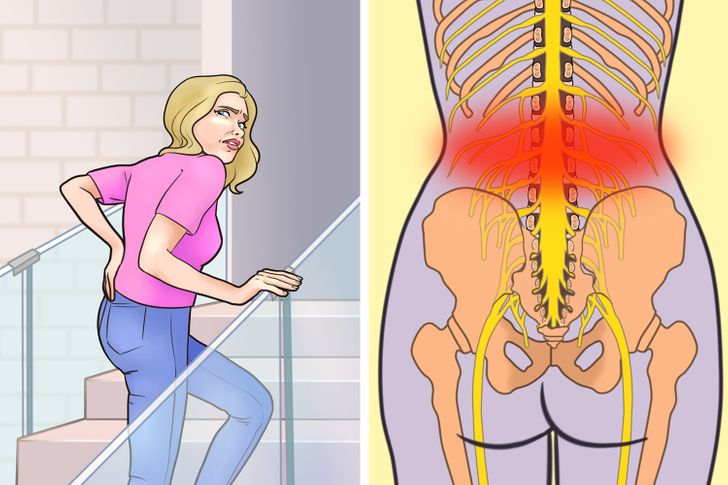You easily get nervous, you have gained a few pounds and your brain constantly has been out of order? All of these signs may indicate that your thyroid isn’t working right. To make sense of what your body is trying to tell you, here are 15 Hidden Signs You Have A Thyroid Problem. hypothyroidism vs hyperthyroidism
15. Excessive sweating

Excessive sweating when you are not doing any physical work can be a sign that there is a problem with your thyroid gland. Hyperthyroidism means you have an overactive thyroid and higher levels of the hormone are produced. Your body somehow has to release the excess heat and fluids, and that is where excessive sweating comes in. The sweating can appear in random spots on the body, the most common are hands, feet, armpits, and under the breasts typical for women. When you are experiencing these symptoms, make sure you don’t waste time, visit your doctor for an exam.
14. Exhaustion or too much energy

Energy shifts and variations can be a red flag that something is wrong with the function of your thyroid. This depends on the secretion of the gland. With hypothyroidism there is less thyroid hormone produced than normal, the body has a slower metabolism and that is why you feel exhausted and fatigued. On the other hand, with increased production of this hormone, you will experience extra energy, and a racing heart, and even sometimes you can feel your heart skipping beats. Take these signs seriously, this is not only a period that will pass. Seek help and the required medications before it gets worse.
13. Anxiety

Anxiety can be related to many conditions, but if you are experiencing a recent anxiety attack for no particular reason, consider checking the thyroid gland. If you have never struggled with anxiety, this can be a hidden warning sign that you have hyperthyroidism. Your body gets flooded with high levels of the hormone, making you jittery and agitated. You just can’t relax and calm your body and mind, and this results in anxiety and severe panic attacks. Talk to a specialist about this matter. Finding the right therapy is key to solving this problem before it gets out of hand.
12. Increased appetite and weight gain

Weight gain alone may not be a sign, but combined with increased appetite, high cholesterol, and other proven triggers, is an indication of a thyroid problem. The lack of hormones tends to provoke a low metabolic rate and decreased energy burning. The food you consume is going to be slowly digested and implanted as body fat. Even if you start working out, the scale will be your worst enemy. So, don’t wait, do the thyroid blood test and stabilize the condition. Many prescription medications do an awesome job of replacing the missing hormone and will have you back on track.
11. Low libido

A little or no desire for sex at all may be related to the thyroid gland and its hormone production. Also, other thyroid side effects such as muscle pain, weight gain, and low energy can affect your sex life and result in low libido.
You need to have a comprehensive approach to all of the factors which can be a part of this problem.
Don’t be ashamed, reach out to a professional and have an open conversation. The solution doesn’t lie in Viagra, you need the fitting medication and additional nutritional supplements to spice things up again in the bedroom.
10. Dry skin

Changes in the appearance and texture of the skin are a result of slow metabolism, which is a symptom of hypothyroidism. Dry and patchy skin with itchy sensations is a consequence of reduced sweating and lack of moisture.
This skin sign also draws your attention with fine lines, wrinkles, and big under-eye bags that become noticeable after a short period of unstable thyroid function.
Your face will have an older, aged appearance. If you experience any of these symptoms, ask for a thyroid blood test. There are many natural solutions and helpful remedies for this type of condition.
9. Hair loss

Thinning and dry hair that breaks very easily and falls out is a pointer that there is an unhealthy process going on inside your body.
This is often related to hypothyroidism and once again, to the low production of hormones.
There is only a small amount of active follicles and that results in hair loss all over the body.
The quality of the hair becomes very bad and poor and the hairs are brittle and fragile.
To stop the continuous hair loss the patient should seek help and with the receiving of proper drugs, hair growth may take up to several months, but may not be complete.
8. Changes in menstrual periods

If a woman suffers from an underactive thyroid gland that will reflect on her menstrual periods. They will become longer, with heavy flow and painful cramps. Also, they will occur closer together.
But then again, if the periods become shorter and further apart, with a very light flow, the cause can be hyperthyroidism. That is why it is very important to make sure you keep track of your cycles, their length, and flow,
to discover whether the problem is irregular cycles or thyroid complications. This can be easily detected and solved in a short period.
7. Constipation or diarrhea

Long battles with constipation, unpredictable bowels, or diarrhea are common hidden signs of a thyroid problem. Blame it on low levels of this hormone that slow down the metabolism to the point where you have no motility in your gut. On the contrary, an overactive thyroid gland causes repeated bowel movements that can end up with frequent runs to the bathroom or even acute diarrhea. The struggle is real in both cases, the body suffers and requires special care to recover. If you are experiencing any of these symptoms, read the signs and let a specialist take care of you. You will feel better in no time.
6. High cholesterol

High cholesterol and underactive thyroid disorder go hand in hand. Low production of thyroid hormones causes high levels of cholesterol. The excess cholesterol is deposited in the arteries and over time it blocks them. This is a warning sign and if you don’t start treating the root problem your health condition will worsen. High cholesterol is a risk factor for heart disease and various problems such as an enlarged heart and heart failure. Until you start taking appropriate therapy for the thyroid disorder, working out and changing the diet, in this case, will not make a huge difference.
5. Depression

If you are wondering if thyroid problems can trigger depression, the answer is one huge YES. When experiencing an unusual and unexpected depression, the cause might be a thyroid gland malfunction. Hypothyroidism is the one to blame.
When this butterfly-shaped gland fails to produce the normal and average levels of the hormone, the serotonin is affected and the body goes into full “down” mode.
Do not try antidepressant drugs, they will not help you with your problem, both depression and hypothyroidism can be treated successfully with thyroid replacement medications. This is the best way to approach and solve this problem forever.hypothyroidism vs hyperthyroidism
4. Neck swelling

If you are starting to notice unusual lumps and nodules on your neck, and maybe even a change in your voice, you probably have a thyroid disorder. Thyroid swelling, medically known as goiter, is an enlarged or swollen thyroid gland caused by multiple growths evolving from the tissue. You can do a home check-up, use a hand mirror and observe your neck as you swallow. If you see any abnormalities see your doctor. You can do a blood test, an ultrasound scan, or even a biopsy. As you know, all of these procedures are safe and will easily find the perpetrator. hypothyroidism vs hyperthyroidism
3. Brain fog

Our body and brain are inextricably linked, so if your body isn’t working right, your brain will follow. When having a thyroid condition the brain feels fuzzy and blurry.
When the body receives higher levels of the hormones it can cause difficulties with concentration and clear thinking because the brain is overwhelmed.
Differing from that, when the levels of the hormones don’t reach the average amount, this may cause subtle memory loss, brain fog, and mental fatigue.
These patients have often brain freezes and difficulty focussing which makes their everyday life and accomplishing simple tasks very hard. hypothyroidism vs hyperthyroidism
2. Muscle pain

If you start feeling inexplicable pain and weird numbness in your extremities this may be a sign of myopathy. Both hypothyroidism and hyperthyroidism can cause it. It is a disease that affects the skeletal muscles. The white blood cells attack the muscles and the adjoining blood vessels resulting in muscle weakness, cramps, and spasms. Over time, the abnormal secretion can damage the nerves, the transmitters of the brain and the spinal cord. Also, some people may experience joint pain and severe joint stiffness. All of these symptoms won’t go away without suitable medications and maybe even additional alternative therapy. hypothyroidism vs hyperthyroidism
1. High blood pressure

Elevated blood pressure is a symptom of both hypothyroidism and hyperthyroidism. They can cause secondary hypertension, which is manifested in shortness of breath, a buzzing sound in the ears, and heart palpitations.
An underactive gland affects both the systolic and diastolic phases and causes diastolic dysfunction. The heart can’t pump blood and neither can relax as before, so the blood vessels become overly rigid.
On the other hand, an overactive gland increases muscle contraction, and consumption and boosts heart rate. That helps the blood vessels to expand and diminish their stiffness. This condition is more evident in patients with existing heart disease. hypothyroidism vs hyperthyroidism
Discover more trends:
Follow us on: Pinterest | Facebook





